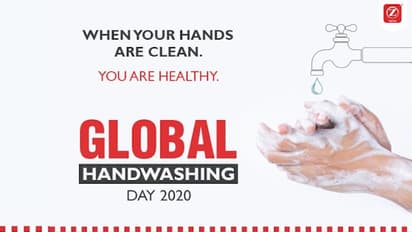Ziqitza Healthcare reinforces 'Hand Hygiene for All' on Global Handwashing Day 2020

Synopsis
Here are some frequently asked questions replied to by Ziqitza Healthcare Limited's Dr Santosh Datar on Global Handwashing Day
October 15 is Global Handwashing Day. The COVID-19 pandemic has reinforced the importance of hand washing which we learned in school but did not follow religiously.
The year, the theme for the Global Handwashing Day is 'Hand Hygiene for All' -- It is a call to action to make hand hygiene reality for all.
One such organisation that has led from the front in this campaign is Ziqitza Healthcare
To understand the criticality of hand hygiene we need to dig deeper and understand as well apply a well-known management and investigation technique of 5 Ws (Who, What, Where, When and Why) and one H (How) to discuss the subject.
Here are some frequently asked questions replied to by Ziqitza Healthcare Limited's Dr Santosh Datar:
What happens when hand hygiene is not maintained?
● The doctors at Ziqitza in all their discussions emphasizes that the fact that as we shake hands, touch animals or animal products, handle raw food items and touch various surfaces such as table tops, door knobs, taps, toilet seats, workstations, equipment, machines, hand railing and many more, our hands pick up germs and chemicals which remain there for a long time.
● If we touch our face, nose or mouth or eyes with contaminated hands, these germs are transmitted to our respiratory passage or eyes and can cause respiratory or eye infections. The COVID-19 and many other respiratory infections and conjunctivitis can be transmitted in this manner.
● If we eat or prepare or handle food with unwashed hands, germs can be ingested causing gastrointestinal infection
● These germs also can cause skin infections especially when you scratch or touch a body part where there may be small cuts or abrasions
● In a hospital setting, germs can be transmitted from one patient to another or to health care professionals and from health care professions to patient if they do not diligently follow hand hygiene protocol
● In a workplace setting, harmful chemicals can be ingested if one eats with unwashed hands. The worker also may get skin irritation or allergies from the lingering chemicals on hands
● Uncut nails and jewellery worn on hands can trap germs and harmful chemicals
Why hand hygiene is important?
● Washing your hands regularly reduces the incidence of respiratory, eye, skin and gastro-intestinal infections
● Ziqitza Corporate Wellness Webinars continuously reinforces that washing your hands regularly at workplace prevents ingestion of harmful chemicals and reduces incidence of skin irritation or allergies
● In a hospital and health care set-up, following hand hygiene protocol reduces hospital acquired infections and also protects health care professionals
Where hand washing facilities should be available?
● Only 60 % of world population has access to basic handwashing facilities
● Availability of running water and liquid soap to everybody is of paramount importance and “Hand Hygiene for All’ cannot be achieved if these facilities are lacking
● Handwashing facilities should be available everywhere including home, cooking areas, all places where people come in contact with animals, restaurants, workplace, educational institutions, public places such as markets, malls, theatres, stadium etc. and of course at health care institutions
● Liquid soap is better than bar soap.
● One also should follow the rule of “Do not eat at your workstation”. Eating at your workplace is common behaviour which leads to compromise of overall hygiene especially hand hygiene to avoid this It is important that hand washing facility is available near the workplace. If it is far away, it is unlikely that hand hygiene protocol will be observed is advice given by Dr. Santosh Datar from Ziqitza.
WHO should wash hands?
● Every individual should regularly wash hands
● However, some professions such as health care professionals, food handlers, cooks, animal handlers, etc. who are likely contract infections or pass on infections to others should diligently follow the hand
hygiene protocol
● Workers handling chemicals such as in laboratories, factories and other workplaces also should follow hand hygiene protocol very meticulously
WHEN should hands be washed?
This is the most critical question which need to be answered and understood so that people keep this in
mind in future as remarked by Dr. Santosh Datar from Ziqitza Healthcare Ltd.
● Before, during and after cooking or handling food
● Before eating
● After toilet use
● When hands are visibly dirty
● After handling animals or animal waste
● After coughing or sneezing
● Before touching your face, mouth, nose or eyes
● After handling chemicals
● While caring for the sick before and after touching the patient
● Before wearing and after removing the mask
● After removing the gloves
HOW hand hygiene is maintained?
● Hand hygiene can be maintained by washing hands or using alcohol rub.
Given below are few pointers that Dr. Santosh Datar from Ziqitza would like to suggest:
● Keep fingernails short
● If hands are likely to get soiled or contaminated during work, remove any jewellery worn on the hand
● Hand washing should be done for 40-60 seconds
● Alcohol hand rub should take 20-30 seconds
● It is important to rub the hands properly as it effectively removes germs
● If the hands are visibly dirty, hand washing is preferred than alcohol rub
At hospital or workplace, the supervisor should randomly observe by using a checklist how the employee is
washing hands. If any deficiency is found, corrective advice should be given.
Explore the latest Lifestyle News covering fashion, wellness, travel, Food and Recipes, and more. Stay updated with trending Health News, fitness tips, and expert insights to inspire your daily living. Discover personalized lifestyle trends that keep you stylish and informed. Download the Asianet News Official App from the Android Play Store and iPhone App Store for everything that adds value to your everyday life.